Mussels of the Lowlands
In the first years after the Second World War, regional literature, adventure novels and leisure literature from the Netherlands and Flanders also found their way to Swiss readers. Additionally, special accents were repeatedly set. (#Avantgarde)
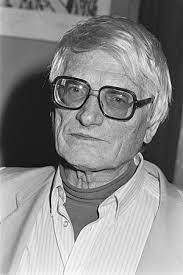
In 1954, the Dutch critic, editor and poet Adriaan Morriën received the 'Preis der Gruppe 47' [Award of the Group 47] for a humorous travel description. A year later, the anthology Ein unordentlicher Mensch [A Disorderly Human] (1955) with translations of Morriën's stories by Heinrich Böll and others was published in Munich. A few years later, Morrien's stories were also published in Switzerland (Ein besonders schönes Bein und andere Mitteilungen aus der Anatomie des Alltags [A Particularly Beautiful Leg and Other Messages From the Anatomy of Everyday Life], 1957). The stories were translated by Johannes Piron, who had good contacts in Switzerland. Together with Wolgang Cordan he published the first volume of translations of works by the Flemish poet Herwig Hensen (Lob der Bereitschaft) with Speer in Zürich in 1949. Piron was an enthusiastic translator of satirical and humorous texts from the Dutch-speaking world. Most translations of Simon Carmiggelt's work are by his hand. In 1963 Piron received the Nijhoff Prize for translation. He introduced the German-speaking world to the works of Bertus Aafjes, Piet van Aken and Aya Zikken.
Mussels of the Lowlands
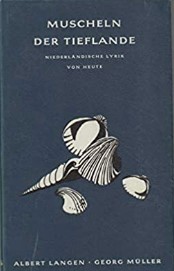
In 1957, Johannes Piron's anthology Muscheln der Tieflande [Mussles of the Lowlands] and Ludwig Kunz' Junge niederländische Lyrik [Young Dutch Poetry] appeared, presenting the younger generation of Dutch-speaking poets.(#Translators)
"This compilation offers hospitality to young Dutch lyricists-poets thus, whose development is linked entirely to today's post-war period: they are beginning to struggle for their own stylistic means, for the views of yesterday and the day before yesterday offer them neither models nor inspiration." (Junge Niederländische Lyrik, 1957, p 5)
However, this did not lead to a breakthrough for the innovators. When the anthology Zwischen Augen und Atem - Niederländische Lyrik seit 1945 [Between Eyes and Breath - Dutch Poetry since 1945] appeared in St. Gallen in 1964, including poems by the Vijftigers Hans Andreus, Remco Campert, Jan Elburg, Gerrit Kouwenaar, Lucebert and others, young Dutch poetry was virtually still unknown in the German-speaking world. Sybren Polet, one of the most important authors of experimental literature in the Dutch language area, explicitly bemoans this in his epilogue to the publication:
"in the twentieth century, modern poetry was somewhat behind in its development, with the exception of a few solitary figures. however, this deficit was quickly made up for from 1945 onwards. [...] after the influences of the most important foreign currents had been processed, an entirely independent poetry emerged in the netherlands. it does not lag behind poetry in the larger linguistic areas" (Zwischen Augen und Atem, 1964, p. 119)
Here on earth
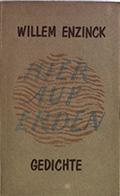
An interesting publication from the mid-1950s is the anthology Hier auf Erden [Here on Earth] by the Dutch poet, art historian, translator, publisher and anthologist Willem Enzinck.
Willem Enzinck was the pseudonym of Aleid Johan Wensink. The publication of this anthology confirms that after the Second World War the ties with the past were not radically severed. Authors who had been banned from publishing in the Dutch language area were still being translated. This applies, for example, to Jo van Ammers-Küller, who, despite being banned from writing, was succesful with German translations of his works after 1945. Willem Enzinck also profited from this uncritical attitude of German translators. During the war, Wensink had worked for the Dutch Departement van Volksvoorlichting en Kunsten [Department of Public Information and Arts] (DVK) and had been commissioned by the Referat Schrifttum [Literature Department], the body responsible for censorship in the occupied Netherlands, to assess manuscripts and the admissibility books for publication. At the same time, he published canticles in praise of the work of Dutch 'Blut und Boden' poets under the pseudonym Johan Ponteyne. Because of all this, he was banned from publishing until the end of 1953. But, this apparently did not stand in the way of the translation of his works.
The first poems by Willem Eninck published in German, translated by Emil Barth, Hans Franck and others, appear in Switzerland, far away from home. But Enzinck did not stick to his Swiss publishers for long. Almost immediately after he started looking for a publisher in Germany. He contacted several publishers, but only in the early 1970s did he finally find a home base with Calatra-Press, the publishing house he founded together with translator Monika Auras.
A love affair in Paris
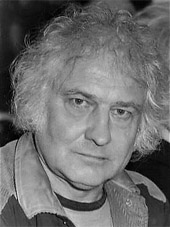
At the end of the 1960s, Jürgen Hillner (#Translators) placed Eine Rose von Fleisch [A Rose of Flesh] (1969) by the Dutch author Jan Wolkers with the publishing house Kurt Desch based in Basel. Desch had already published Fanny Hill. Memoirs of a Woman of Pleasure by John Cleland in 1968. But Wolker's story of Daniel, who cannot cope with the death of his young daughter, did not receive the expected response.
It was not until the mid-1970s that Wolkers reached the general public with Türkische Früchte [Türkish Delight], which was also translated by Jürgen Hillner. Unfortunately, the book was an "extra-literary [...] sensation" (Schmidt, 1976). It was apparently more a matter of breaking taboos than literary quality.
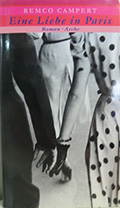
The reception of Remco Campert, translated for Swiss readers by Marianne Holberg (translator of among others Maarten 't Hart, Hella Haasse and Vonne van der Meer), went quite differently. In 2005, she published the translation of Een liefde in Parijs (Eine Liebe in Paris) with Arche. Campert, poet and writer of stories and columns, is considered one of the most prominent representatives of the Vijftigers, the movement that radically changed the image of Dutch literature after 1945. In Eine Liebe in Paris [A Love in Paris], Campert tells the story of Richard Sanders, who on the occasion of the publication of his new book 'De kunst van het vergeten' (The Art of Forgetting) returns to Paris, the city where many Dutch poets, writers and painters had sought their fortune in the 1950s. Through an encounter with Sacha, who had had a son by Richard, the trip to Paris becomes a journey through his memories. The book was very well received:
"In this slim volume, which is an easy but also a great pleasure to read, Campert proves to be a manipulative author who knows how to draw the attention of his readers with skill as much as calculation. With even greater artistry and only little narrative effort, Campert knows how to expose the most hidden emotions of his characters." (Bucheli, 2005)
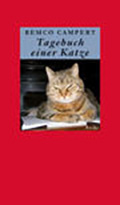
Wie in einem Traum [Like in a Dream] (2006) was also positively received, in particular because of the "indeterminacy, a withdrawnness that is not devoid of clarity" (Perlentaucher, 2006). Campert's Herz aus Seide [Heart of Silk] (2007) was received similarly positive: "refreshing and sensitive" (Lüthi, 2007). Tagebuch einer Katze fianlly became a small bestseller. The Berner Zeitung wrote "A true bijoux, full of wit and irony" (Insel, publisher's presentation). Tagebuch einer Katze, which appeared both in a hardcover and a paperback edition, was also published as an audio CD and can even be listened to on Spotify. (https://open.spotify.com/album/2BcYh5T0yaNqNiRwbMLodK)
In 2011 Arche crowned Campert's oeuvre with the publication of Jagen, Leben, Erinnern [Hunting, Living, Remembering], an anthology of Campert's best poems from five decades, and later with further translations of his poetry in Offene Augen [Open Eyes] (2022).
Poetry is an Act
Poetry is a statement
of confirmation. I confirm
that I’m alive, that I don’t live alone.
Poetry is a future, thinking
of next week, of another country,
of you when you’re old.
Poetry is my breath, it moves
my feet, hesitantly sometimes,
around the world, requiring that.
Voltaire had smallpox, but
he cured himself by drinking, for one thing,
120 liters of lemonade: that is poetry.
Or take the ocean surf. Thrown and broken
on the rocks, it’s not really beaten,
it regroups and is poetry as such.
Each word being written,
takes its toll on old age.
In the end death wins, true,
but death is merely the silence in the house
after the last word on stage sounds.
Death means: to be moved.
Remco Campert (Transl. Arno Bohlmeijer) (Poetry)
Failure as melancholic liberation (Nef: 1987)
J. Bernlef, founder and editor of Barbarber and one of the most important representatives of neo-realistic poetry in the Dutch-speaking world, was introduced to the German-speaking world by the translator Maria Csollány (translator of among others Anna Blaman, Gerhard Durlacher, Etty Hillesum and Hella Haasse). (#Translators) In 1986, Csollány translated Bernlef's bestseller Hersenschimmen [Out of Mind] for Nagel & Kimche (Hirngespinste). Bernlef's "touching" (Nef, 1987) novel became a success.
Despite all its painfulness, "Hirngespinste" is also a comforting book. And a very tender one. Without ever embellishing, it is never exposing. People retain their dignity right until the end, and the love that bound them together all their lives. (Obermüller, 1986).
Hirngespinste was published repeatedly, by Volk und Welt in 1988 and by Piper in 1989. But this did not lead to Bernlef's breakthrough in the German language area. Bernlef's success, unfortunately, remained largely limited to Hirngespinste. Further translations by Bernlef only appeared when Flanders and the Netherlands were guest of honor the Frankfurt Book Fair: in 1993 Zwischen Eisbergen [Between Eisbergs] (Suhrkamp) and in 2016 a reprint of Maria Csollány's translation of Hersenschimmen by Reclam.
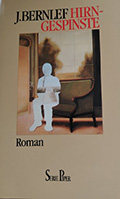
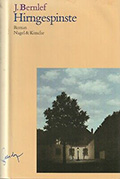
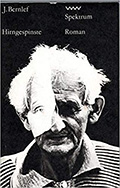
Between eye and breath
In Switzerland, interesting accents are constantly being set. Apparently there is an interest in new literature from the Netherlands and Flanders and which is presented with some regularity. But, it cannot be said that Switzerland has become the centre for new literature in the German-speaking world. Morrien, Campert and Bernlef have remained exceptions. Good choices are being made but without any follow through.
(Herbert Van Uffelen)
References
Bucheli, Roman: Die Kunst des Vergessens - Der Roman 'Eine Liebe in Paris' Des Niederländers Remco Campert. In: Neue Zürcher Zeitung, Vol.: 256, Issue: 2. nov., (2005) - p. 37.
Insel (Verlagspräsentation): (https://www.suhrkamp.de/buch/remco-campert-tagebuch-einer-katze-t-9783458359449)
Junge niederländische Lyrik Ed.: Kunz, Ludwig - Illustr.: Appel, Karel [Mit 11 Zeichnungen] - Preface/Postface: Kunz, Ludwig [Eingeleitet] - 1. ed. - Stierstadt im Taunus : Eremiten-Presse, (1957)
Lüthi, Andrea: Wandel eines Zynikers. In: Neue Zürcher Zeitung, Issue: 8. dec., (2007). (https://www.perlentaucher.de/buch/remco-campert/das-herz-aus-seide.html)
Nef, Ernst: Scheitern als melancholische Befreiung - J. Bernlef: 'Hirngespinste'. In: Neue Zürcher Zeitung, Issue: 4. März - Zürich, (1987).
Obermüller, Klara: Einer, der sein Leben vergass - 'Hirngespinste', ein Roman von Jan Bernlef. In: Die Weltwoche, Issue: 6. Nov., (1986).
Perlentaucher: (2006). (https://www.perlentaucher.de/buch/remco-campert/wie-in-einem-traum.html)
Poetry: https://exchanges.uiowa.edu/issues/without/a-poem-by-remco-campert/
Schmidt, J.: Er schwadroniert, um nicht zu weinen. In Frankfurter Allgemeine Zeitung, Nr. 198, 28. Aug. (1976) - p. 20.
Zwischen Augen und Atem - niederländische Lyrik seit 1945 Ed.: Schneeweiss, Heinrich - Illustr.: Bruning, G. [Mit 4 Original-Holzschnitten und einer Zeichnung] - Preface/Postface: Polet, Sybren [Nachwort] - Trans.: Schneeweiss, Heinrich - 1. ed. - St. Gallen; Stuttgart : Tschudy, (1964) (Quadrat-Bücher; 40/41)
